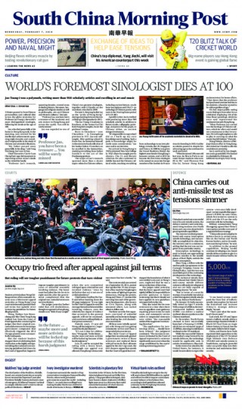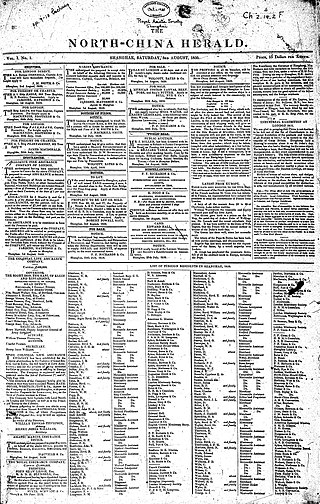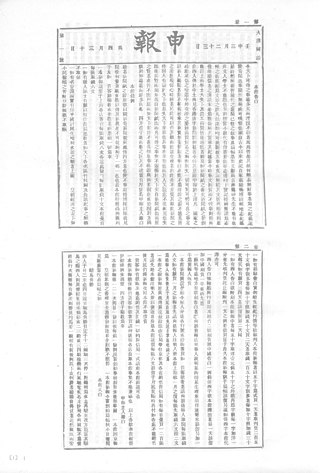| | |
| Editor-in-chief | Ting Wu |
|---|---|
| Publisher | Shanghai United Media Group |
| Founded | 2016 |
| Based in | Shanghai, China |
| Language | English |
| Website | www |
Sixth Tone is a state-owned English-language online magazine published by Shanghai United Media Group. [1] [2]
| | |
| Editor-in-chief | Ting Wu |
|---|---|
| Publisher | Shanghai United Media Group |
| Founded | 2016 |
| Based in | Shanghai, China |
| Language | English |
| Website | www |
Sixth Tone is a state-owned English-language online magazine published by Shanghai United Media Group. [1] [2]
Sixth Tone's name relates to the number of tones in Mandarin Chinese, but also is stated to carry more metaphorical meaning as well. Mandarin Chinese has four active tones and a fifth dropped tone that has less prominence than the other four. Because of the language's five tones, the publication's name refers to an ideal of expanding beyond traditionally-reported items in Anglophone media, making it the "sixth tone". [3]
The online magazine began publication on April 6, 2016, with an investment of US$4.5 million from the Shanghai United Media Group. [1] It is a sister publication of The Paper. [2] Wei Xing was its first editor-in-chief until May 30, 2016, when he moved to create a start-up company and therefore no longer worked for the paper. Succeeding Wei, Zhang Jun became the new editor-in-chief that year. [1]
By 2018, Western media began to cite Sixth Tone in news reports. [3] Vincent Ni, in an essay published in Westminster Papers in Communication and Culture, stated that, "For foreign journalists, it has also shown a diverse and authentic side of China that rarely received much attention elsewhere" and that the publication "has proved far more effective than the hundreds of millions of dollars invested in English-language news programs by the state broadcaster Xinhua, CCTV, and CRI." [3]
Bethany Allen-Ebrahimian, writing for Foreign Policy, stated that Sixth Tone has a less staid and "saccharine" tone compared to many other English-language publications from China. [1] She stated, "If webby U.S. media startup Vox were acquired by the Chinese Communist Party, it might resemble Sixth Tone". [1]
In a 2016 interview with The New York Times , the then-editor-in-chief, Wei Xing, sought to differentiate his magazine from other Chinese English-language publications. Wei stated that compared to other government-owned news publications, Sixth Tone would have an easier time growing since it "lacks a politics-saturated bureaucracy because it is a start-up". [2]

Chinese is a group of languages spoken natively by the ethnic Han Chinese majority and many minority ethnic groups in Greater China. About 1.3 billion people speak a variety of Chinese as their first language.

Mandarin is a group of Sinitic dialects that are natively spoken across most of northern and southwestern China. The group includes the Beijing dialect, the basis of the phonology of Standard Chinese, the official language of China. Because Mandarin originated in North China and most Mandarin dialects are found in the north, the group is sometimes referred to as Northern Chinese. Many varieties of Mandarin, such as those of the Southwest and the Lower Yangtze, are not mutually intelligible with the standard language. Nevertheless, Mandarin as a group is often placed first in lists of languages by number of native speakers.

Hanyu Pinyin, often shortened to just pinyin, is the most common romanization system for Standard Mandarin Chinese. It is used in official contexts where Standard Chinese is an official language as well as by the United Nations and in other international contexts. It is used principally to teach Mandarin, normally written with Chinese characters, to students already familiar with the Latin alphabet. The system uses four diacritics to denote tones, though these are often omitted in various contexts, such as when spelling Chinese names in non-Chinese texts, and writing words from non-Chinese languages in Chinese-language texts. Hanyu Pinyin is also used in various input methods to type Chinese characters on computers, some Chinese dictionaries use it to arrange entries. The word Hànyǔ literally means "Han language", while Pīnyīn (拼音) means "spelled sounds".

Standard Chinese is a modern standardized form of Mandarin Chinese that was first codified during the Republican Era (1912‒1949). It is designated as the official language of mainland China and a major language in the United Nations, Singapore, and Taiwan. It is largely based on the Beijing dialect. Standard Chinese is a pluricentric language with local standards in mainland China, Taiwan and Singapore that mainly differ in their lexicon. Hong Kong written Chinese, used for formal written communication in Hong Kong and Macau, is a form of Standard Chinese that is read aloud with the Cantonese reading of characters.

Gwoyeu Romatzyh, abbreviated GR, is a system for writing Mandarin Chinese in the Latin alphabet. The system was conceived by Yuen Ren Chao and developed by a group of linguists including Chao and Lin Yutang from 1925 to 1926. Chao himself later published influential works in linguistics using GR. In addition a small number of other textbooks and dictionaries in GR were published in Hong Kong and overseas from 1942 to 2000.

Wen Wei Po is a pro-Beijing state-owned newspaper based in Hong Kong. The newspaper was established in Hong Kong on 9 September 1948, 10 years after the launch of its Shanghai counterpart in 1938.

Wu is a major group of Sinitic languages spoken primarily in Shanghai, Zhejiang Province, and the part of Jiangsu Province south of the Yangtze River, which makes up the cultural region of Wu. Speakers of various Wu languages sometimes inaccurately labelled their mother tongue as Shanghainese when introduced to foreigners. The Suzhou dialect was the prestige dialect of Wu as of the 19th century, and formed the basis of Wu's koiné dialect, Shanghainese, at the turn of the 20th century. The languages of Northern Wu are mutually intelligible with each other, while those of Southern Wu are not.
The Shanghainese language, also known as the Shanghai dialect, or Hu language, is a variety of Wu Chinese spoken in the central districts of the City of Shanghai and its surrounding areas. It is classified as part of the Sino-Tibetan language family. Shanghainese, like the rest of the Wu language group, is mutually unintelligible with other varieties of Chinese, such as Mandarin.

Beijing Foreign Studies University, is a public university in Beijing, China. BFSU boasts the oldest language programs in China offering the largest number of foreign language majors on different educational levels. Located in Haidian District of Beijing. BFSU is divided into east and west campuses. BFSU offers the widest range of language studies in China: as of September 2023, there are 101 foreign languages being taught in this university. It is a Chinese state Double First Class University identified by Chinese Ministry of Education. BFSU is commonly known as Beiwai in Mandarin. Beijing Foreign Studies University is a sister school to Peking University (PKU) which is also subordinate to the Ministry of Education. For this reason BFSU students are able to register for courses at PKU.

Shanghai International Studies University is China's leading university in linguistics, cultural studies, and global and area studies. Established in December 1949, SISU is known for being one of the earliest institutions where China's higher education in foreign languages took shape. It was listed in the Double First Class University identified by the Ministry of Education and former Project 211.

Cantonese is a language within the Chinese (Sinitic) branch of the Sino-Tibetan languages originating from the city of Guangzhou and its surrounding Pearl River Delta. It is the traditional prestige variety of the Yue Chinese group, which has over 82.4 million native speakers. While the term Cantonese specifically refers to the prestige variety, it is often used to refer to the entire Yue subgroup of Chinese, including related but partially mutually intelligible varieties like Taishanese.

The South China Morning Post (SCMP), with its Sunday edition, the Sunday Morning Post, is a Hong Kong-based English-language newspaper owned by Alibaba Group. Founded in 1903 by Tse Tsan-tai and Alfred Cunningham, it has remained Hong Kong's newspaper of record since British colonial rule. Editor-in-chief Tammy Tam succeeded Wang Xiangwei in 2016. The SCMP prints paper editions in Hong Kong and operates an online news website that is blocked in mainland China.

Romanization of Chinese is the use of the Latin alphabet to transliterate Chinese. Chinese uses a logographic script and its characters do not represent phonemes directly. There have been many systems using Roman characters to represent Chinese throughout history. Linguist Daniel Kane wrote, "It used to be said that sinologists had to be like musicians, who might compose in one key and readily transcribe into other keys." The dominant international standard for Standard Mandarin since about 1982 has been Hanyu Pinyin, invented by a group of Chinese linguists, including Zhou Youguang, in the 1950s. Other well-known systems include Wade–Giles and Yale romanization.

The North China Daily News, was an English-language newspaper in Shanghai, China, called the most influential foreign newspaper of its time.
The Global Times is a daily tabloid newspaper under the auspices of the Chinese Communist Party's flagship newspaper, the People's Daily, commenting on international issues from a Chinese nationalistic perspective. The publication is sometimes called "China's Fox News" for its propagandistic slant and the monetization of nationalism. Xiang Lanxin, a former Global Times columnist who left due to its nationalism, wrote that it would be a "great shame" if history equated the Global Times with Der Stürmer, a Nazi propaganda tabloid.

Shen Bao, formerly transliterated as Shun Pao or Shen-pao, known in English as Shanghai News, was a newspaper published from 30 April 1872 to 27 May 1949 in Shanghai, China. The name is short for Shenjiang Xinbao, Shenjiang being a short form of Chunshen Jiang, the old name for the Huangpu River.

Shanghai United Media Group is a state media company of the People's Republic of China, established on October 28, 2013, through the merger of the city's two largest newspaper groups, the Jiefang Daily Press Group and the Wenhui–Xinmin United Press Group. The media group is overseen by the Shanghai committee of the Chinese Communist Party (CCP).

A Syllabic Dictionary of the Chinese Language: Arranged According to the Wu-Fang Yuen Yin, with the Pronunciation of the Characters as Heard in Peking, Canton, Amoy, and Shanghai or the Hàn-Yīng yùnfǔ 漢英韻府, compiled by the American sinologist and missionary Samuel Wells Williams in 1874, is a 1,150-page bilingual dictionary including 10,940 character headword entries, alphabetically collated under 522 syllables. Williams' dictionary includes, in addition to Mandarin, Chinese variants from Middle Chinese and four regional varieties of Chinese, according to the 17th-century Wufang yuanyin 五方元音 "Proto-sounds of Speech in All Directions".

The Governance of China is a four-volume collection of speeches and writings by Xi Jinping, the General Secretary of the Chinese Communist Party and current paramount leader of China. Presenting the official party line for China's development in the 21st century, the collection is an authoritative source on Xi Jinping Thought.
The Paper is a Chinese digital newspaper owned and run by the Shanghai United Media Group.